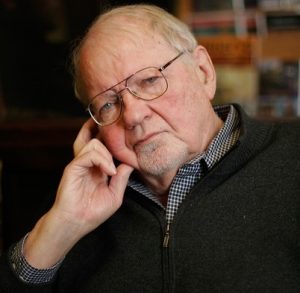Fredric Jameson (1934-2024)
 Scholar and critic Fredric Jameson, 90, died September 22, 2024 in Durham NC. Jameson was an immensely consequential figure in the world of literary theory and cultural criticism, and a lifelong devotee of SF.
Scholar and critic Fredric Jameson, 90, died September 22, 2024 in Durham NC. Jameson was an immensely consequential figure in the world of literary theory and cultural criticism, and a lifelong devotee of SF.
Jameson was born April 14, 1934 in Cleveland OH. He attended Haverford College as an undergrad, then did graduate work at Yale. His PhD thesis was published as Sartre: The Origins of a Style (1961). He was also a Fulbright Scholar and studied in Germany. He worked as a professor of French and comparative literature at Harvard (1959-67); the University of California, San Diego (1967-76); Yale (1976-1983); and the University of California, Santa Cruz (1983-1985), before settling at Duke University in 1986, where he spent the rest of his career, becoming the Knut Schmidt-Nielsen Professor of Comparative Literature, Professor of Romance Studies (French), and Director of the Institute for Critical Theory. While in California, he oversaw Kim Stanley Robinson’s doctoral thesis on Philip K. Dick.
Jameson wrote extensively on science fiction, often in Science Fiction Studies, including notable essays like “Generic Discontinuities in Science Fiction: Brian Aldiss’ Starship” (1973), “After Armageddon: Character Systems in P.K. Dick’s Dr. Bloodmoney” (1975), “World Reduction in Le Guin: The Emergence of Utopian Narrative” (1975), “Progress versus Utopia; or, Can We Imagine the Future?” (July 1982), “Science-Fiction as a Spatial Genre — Generic Discontinuities and the Problem of Figuration in Vonda McIntyre’s The Exile Waiting” (1987), “The Space of Science Fiction: Narrative in A.E. Van Vogt” (1989 ), “Longevity as Class Struggle” (1996), “‘If I Find One Good City, I Will Spare the Man’: Realism and Utopia in Kim Stanley Robinson’s Mars Trilogy” (2001), and “The Politics of Utopia” (2004). Many of his SF essays were collected in Archaeologies of the Future: The Desire Called Utopia and Other Science Fictions part two (2005). Part one, “The Desire Called Utopia”, is a book-length examination of utopia, dystopia, SF, and fantasy.
Other notable works include Signatures of the Visible (1990), Postmodernism, or, the Cultural Logic of Late Capitalism (1991), The Seeds of Time (1994) and The Cultural Turn: Selected Writings on the Postmodern (1998), The Antinomies of Realism (2013), and An American Utopia: Dual Power and the Universal Army (2016), which discuss SF works and ideas in various contexts.
He wrote numerous other volumes on subjects ranging from Marxist theory to film to Bertrold Brecht. He has been the subject of several volumes by others, including Fredric Jameson by Adam Roberts (2000). Jameson won a Pilgrim Award for contributions to SF scholarship in 2006, and the Modern Language Association presented him with an Award for Lifetime Scholarly Achievement in 2012.
For more, see his entry in the Encyclopedia of Science Fiction.



